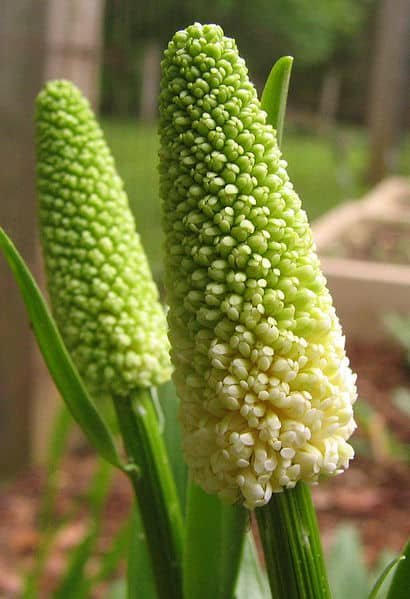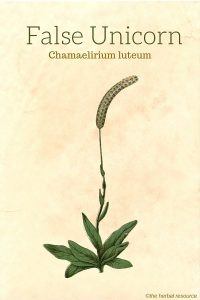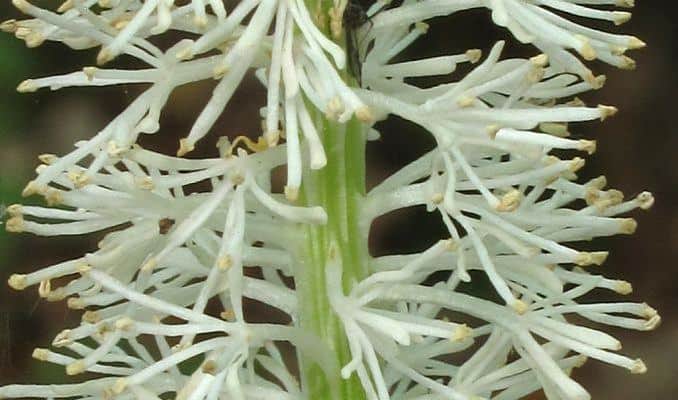Botanical Name: Chamaelirium luteum.
Other Common Names: Fairywand, helionas dioica, helonias lutea, veratrum luteum, chamaelirium carolinianum, helionas root, blazing star root, devil’s bit, starwort.
Habitat: False unicorn is a flowering herb originally found in moist areas east of the Mississippi River but also common in other southern states.
Description: False unicorn is a herbaceous perennial, native to North America is 30-100cm high and has a smooth, angular stem and alternate leaves. It is narrow at the base and formed into a whorl.
There are numerous small greenish-white flowers in a dense terminal. The bulbous rhizome terminates abruptly and gives off fine wiry pale roots. The chamaelirium luteum plant prefers low moist ground.
Plant Parts Used: Roots and dried rhizome.
Therapeutic Uses, Benefits and Claims of False Unicorn
This herb is recognized as a valuable tonic to the reproductive system, mainly but not exclusive to women.
False unicorn seems to have a “normalizing” effect on the female reproductive system, encouraging a regular menstrual cycle.
False unicorn has a reputation for improving fertility mainly in women
The herb is believed to be effective in treating amenorrhea. It is also noted for its ability to relieve the symptoms of morning sickness.
It is used as an herbal remedy for many symptoms associated with menopause.
False unicorn may help improve low sex drive in some women.
False Unicorn is commonly used to treat menstrual abnormalities and other complications arising from the imbalance of female hormones and it has been used traditionally to treat menstrual cramps.
It appears to improve the secretory responses and cyclical functions of the ovary and appears to have a beneficial action on that organ.
While most uses of false unicorn are recognized as beneficial to women, false unicorn can be equally beneficial for men and is believed to be useful in the treatment of impotence.
Its tonic properties are of benefit to the treatment of lack of appetite and digestion, and it also suggests the ability to kill and help expel tapeworms.
False unicorn has been recognized as an effective diuretic.
There have also been claims made that this medicinal plant may be effective in the treatment of headaches and even depression.
False unicorn combines well with echinacea (echinacea angustifolia) for the treatment of chronic pelvic inflammation.
False unicorn is believed to be helpful in the prevention of miscarriage, however, for pregnant women, a discussion with a healthcare provider about this or any other herb or medication is extremely important and should not be avoided.
Dosage and Administration
Most commonly false unicorn is taken as a tea. To do this, put 1 – 2 teaspoonfuls of the root in a cup of water, bring to the boil and simmer gently for 10 – 15 minutes. It is recommended that you drink this three times a day.
Tincture: take 2 – 4 ml of the tincture three times a day.
If taking the dried root, take 1/4-1/2 teaspoon (1-2 grams) three times per day.
Side Effects of False Unicorn
As with any medication or herbal supplement, you should always seek the advice of your healthcare provider before use especially when pregnant or breastfeeding.
Although there have not been any reports of adverse effects of false unicorn there have been rare cases reported that suggest that very large doses may cause nausea and vomiting.
When administered with estrogen and progesterone, false unicorn root may alter the action of hormones that affect the uterus.
So a discussion with your pharmacist as well as your doctor or health care provider is very important when using any prescribed medications while taking this herb or any other supplemental herbs.
Thordur Sturluson
Latest posts by Thordur Sturluson (see all)
- What is the Difference Between Hemp and Marijuana? - June 3, 2019



Hi there!
Im doing my midterm project on this herb and I was wondering if you had any studies to back up the uses of Chamaelirium!